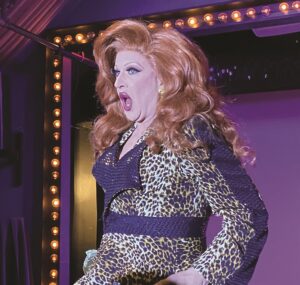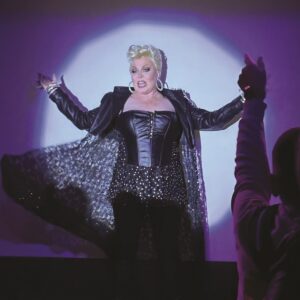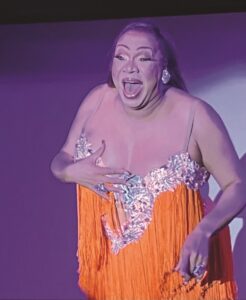For all its fierce glamour and industrial-strength levels of hairspray, a drag show is a fragile thing. The delicate alchemy of performer, venue, and audience can be lost when an established show moves to a new place.
Fortunately for Illusions — the longest continuously running drag review in Provincetown — the move down Commercial Street from the Crown & Anchor to the Post Office Cabaret this year has not diminished its sparkle. If anything, it’s enhanced it. The show is tighter, funnier, and more relevant than ever, and its trio of veteran performers — Billie Jean Beetem, Lakia Mondale, and Payton St. James — are in top form.

The smaller venue allows the audience to be closer to the performers. Often, when a performer leaves the stage to work the room, some in the audience are left staring at a blank space for a long stretch. But at the Post Office, those segments feel more intimate, which amplifies the anything-can-happen vibe. It’s classic Provincetown, and Illusions is a classic drag show.
Over coffee and sequins, the three stars of Illusions told the Independent about their first shows, about working P’town crowds, and about making that money, honey.
Billie Jean is the show’s longest-running cast member, having started with the original cast 36 years ago when it was known as A Bare Touch of Vegas. The name changed to Illusions when the show landed at the Crown & Anchor. A native of Kansas, Billie Jean made her way to Boston and then Provincetown in the late 1980s. She is now the team leader, director, costume designer, and heart of the show.
“This show is classic drag,” says Billie Jean, who is the manager of Snip Salon in Provincetown when she’s not performing. “Wigs, costumes, lip-synching, live singing, stand-up comedy, celebrity impressions, group numbers, and characters.”

Among those characters is Minerva, a former aerobics instructor turned gangster rapper. On opening night earlier this month, Minerva tore up the center aisle as she rapped a particularly filthy set of lyrics. The audience roared its approval. Her other characters include Pat Benatar, Stevie Nicks, and — coming soon — Dolly Parton.
Billie Jean’s repertoire is complemented by the impressions her costars bring to the stage. “Each of us brings different flavors to the show,” she says. “We have very different personalities.”
Originally from Boston, Payton St. James has been honing her comedic chops with Illusions for a decade. (Offstage, she becomes Michael McAdam, the corporate director and assistant to the CEO of Salt Hotels.) “My favorite part of performing is being able to talk to the audience,” she says. “I may have had the worst day, but the minute I walk out on that stage and see these people who have come and given us their time and attention and want to be entertained — well, it’s infectious.”
Payton’s impressions include Liza, Shania, and Adele. But her first drag performance was in an avant-garde production of Godspell, in which she sang the showstopping “Turn Back, O Man” dressed as a late-in-life Katharine Hepburn.
Lakia, the third member of the triumvirate, is a force of nature. There’s a palpable rise in the show’s energy as she’s about to come onstage, and her big personality fills the space. The audience clamors to give her tips.

By day, Lakia is a team member at Outer Cape Health Services. She comes from St. Petersburg, Fla., where her drag journey began in high school.
“My first costume was a one-shoulder silver number with heavy duty sequins,” she recalls. “My drag mother had me stand in it and then took a pair of scissors and started ripping it at the bottom. Then she hot-glued white feathers on it and made a little pillbox hat to match. I hated it, but I wore it.”
The cast is tight offstage. “Lakia lives with me,” says Billie Jean. “Payton used to live with me. We’re all very dear friends.”
That camaraderie was evident on opening night, when an intoxicated patron repeatedly walked onstage to chat with the performers — and later gathered up stray tips from the floor and walked into the dressing room to deliver them. Not one of the three performers was fazed.
“He was just fine,” said Billie Jean.
“Some people just need their moment,” said Payton.
“I love those moments!” said Lakia. “What matters is that everyone was having a good time.”
And what about rowdy bachelorette parties?
“We love them!” say all three. If Provincetown is ever called upon to send a diplomatic drag delegation to the United Nations, look no further than this trio.
A mainstay of Illusions has the performers venturing into the audience to collect tips. Back in the 1970s — when drag was more underground — tips at bars and clubs were often the only money they made. Today, drag is mainstream entertainment. A ticket for Illusions costs $35 — and some touring drag stars charge as much as $150 for the best seats at their shows. Why do audiences still want to tip? The Illusions cast says it’s about a connection that transcends monetary value.
“It incorporates them into the show,” says Billie Jean.
“I’m hoping that in that moment they are saying, ‘Oh my God, I love what you’re doing!’ ” says Lakia. “It means I did my job. I got it right.”
“You can tell people who are there for the first time,” says Payton. “Someone will reluctantly raise their hand — or more likely, their friends will be pointing them out. I want to take that person who has never seen a drag queen up close and let them see me.”
“But you’re also happy — now you can take that tip money and add to your wardrobe,” says Lakia, ever practical. “Because drag never stops.”
